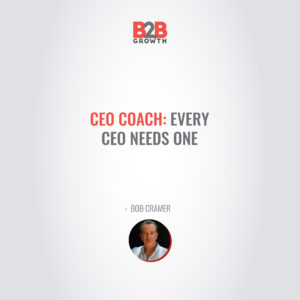On April 18, 2016, a memorial took place in Silicon Valley.
The deceased was a guy nicknamed “ballsy” who loved to give big hugs.
He was also the greatest executive coach you’ve never heard of.
In the audience were Eric Schmidt, Tim Cook, Mary Meeker, Sheryl Sanberg, John Doerr, and Jeff Bezos, Dan Horowitz, Marc Andressen, among many others.
Bill had coached each of them, some for over 15-years.
They sat solemnly and listened to his college football teammate eulogize this person they each deeply loved.
He was not only their coach but became a lifelong friend.
That person was Bill Campbell, the subject of a New York Times bestseller written by Eric Schmidt, the former CEO of Google.
The book, Trillion Dollar Coach, reveals that “to be a great manager, you have to be a great coach. After all, the higher you climb, the more your success depends on making other people successful.”
By definition, that’s what coaches do.
I have been meaning to read this book for some time and finally got to it this year.
It is, by far, one of the most insightful books on what it takes to be a CEO, and the role of coaching to help you reach mastery.

source: Bill Campbell, Silicon Valley Business Journal
My Coach
I can relate to the deep admiration, discussed in the book, that develops between a CEO and their coach.
My friend Paul Butare was my coach for over a decade. He was my go-to person when I had no one else to speak to about a topic. When I wanted to celebrate a win or agonize over a loss in my business, he was there.
We spoke once or twice a week for over a decade. Paul visited with my management to help them work through issues. He helped me to understand the difference between being a founder and being a CEO. He referenced his own experience, anecdotal stories, and often his sobering honesty to help me see through the fog.
I am forever grateful for his help as I navigated a venture full of the limitless challenges on my way to success.
Thank you, Paul.
Back to the Coach Bill
Eric’s book memorializes and open-sources Bill Campbell’s playbook. Bill taught some of the greatest leaders in Silicon Valley some simple, yet powerful lessons on leading. I learned a lot from the book.
My key learnings include:
- Care about the people more than winning
- Put the team above any one individual
- Think beyond the company, and have a worldview
- To be a great manager, you have to be a great coach
- Practice psychological safety (the manager has your back)
- Take a sincere interest in your team (and their families)
- Have dignity and respect
- Practice effective management skills (1:1s; staff meetings; challenging employees; building trust; build strong teams)
- Bring love into the workplace, yes love.

Bob Cramer, CramerAdvisory.com
To put the book in context and explore more about coaching, I called my friend Bob Cramer, asked him to read it–he already had–and invited him for a chat to discuss it.
Bob is a five-time-CEO turned Coach.
He is one of the leading CEO coaches of venture-backed, high-growth companies. Before coaching, Bob was the CEO of 5 companies, board member, and investor. He’s navigated multiple start-ups from Series-A to liquidity and knows what it’s like to be in the CEO’s seat. He was even featured on the cover of Inc. Magazine in 2008 as “the serial CEO that VCs love and start-ups want.”
His passion is to empower CEOs (especially founders) to thrive in their position while remaining balanced and fulfilled in their personal life.
His coaching style is similar to Bill Campbell’s. We had a great time discussing the role of CEO and his experience over the past decade as a coach to founders and CEOs of high-growth companies.
Here’s part of our conversation:
JB: What is a coach? How would you describe what a coach does?
BC: It starts with being a trusted confidant. A coach is not a consultant who comes in and says, “I have this expertise, I’m going to look at your situation and tell you exactly what to do.” A coach points out opportunities, areas for improvement, and helps you see things more clearly and broadly without the filters that sometimes get in your way. And then helps you figure out how to execute on that opportunity.
I meet with my CEOs every week for about an hour. That regularity enables a certain level of understanding of the individual, business, board, strategy, products, team, and culture. That familiarity allows us to help determine an action path forward, and then hold them accountable to that plan. It’s a very close, trusting relationship that I would have loved to have had when I was CEO.
It’s valuable to have someone as a sounding board who is not on your executive team, board, or a co-founder, spouse or partner, that really understands what it’s like to be in your seat and that you can have a real conversation with.
JB: How do you go about coaching a CEO? What’s the first step?
BC: The first step is making sure there’s a relationship there that works. As a CEO, get a visceral sense as to whether there’s a connection, whether you can trust this person, and whether they get what you’re saying. And then, as a coach, is the CEO self-aware, are they the type of person who wants to learn and be substantially better than they are right now? So step one is, is there a match, and are they coachable.
My next step involves doing an assessment. It can either be a self-assessment by the CEO, or a 360 evaluation of the CEO that includes the board, and executive team. I assess against ten dimensions of what I’ll call a “Prototypical Perfect CEO,” even though one doesn’t exist. It gives us a baseline of where we feel we’re strong, and where there may be gaps or areas that would benefit from further development. Then, based on the stage of company growth, we co-develop a personal development plan for the CEO that says here are the primary areas we want to work on over the next 6-12 months with clear, measurable actions and target results.
JB: What would say you’re trying to do exactly, by coaching?
BC: We’re trying to enable you to be the absolute best CEO you can be in any situation. There are two types of coaching that I use to accomplish this. The first is “situational” coaching. This kind of coaching looks at what we want to personally develop, what’s working and what’s not in the business, and what do we have to accomplish? Often, we explore a situation that didn’t quite go the way we may have wanted, or one coming up that’s important. For one that didn’t go well, we can “look at the film,” tear it apart, and ask, “why did it go that way,” and “how could it have gone differently”? For upcoming ones, we can explore best practices, different options, and decide on a clear path forward.
The other type of coaching is “transformational.” Transformational coaching is looking more in-depth at what’s in your “history” (past experiences, cultural upbringing, traumas, etc.) that might cause you to “get in your own way.” What “stories” do you create around a situation as a result of that history, and how can you open up your mind to new possibilities and opportunities that aren’t limited by those stories? Then, based on those new opportunities, we determine a clear and better path forward to execute on.
There is a lot of probing as a coach, with powerful questions that surface important issues, and a coach must be fully present with strong, active listening.
“A coach is someone who tells you what you don’t want to hear, who has you see what you don’t want to see, so you can be who you’ve always known you could be.”–Tom Landry
JB: Do you believe the role of the CEO is also to be a coach to the management team? If so, do you spend time teaching them how to be coaches?
BC: Absolutely. What’s your take on this one, John?
JB: Absolutely! In my experience as CEO, one of the skills that you’re trying to be really good at is helping people develop mastery in their role. You’re trying to build mastery in your CEO role, but all of the other mini CEO’s out there also have to develop mastery. Serving as their coach and confidant is a very powerful position, and very challenging to differentiate between “Hey, I’m telling you to do this” and “Hey, I just want to ask you a few questions to help you think about this.” That’s what I’ve been learning myself.
BC: Yes, my sense is that managing anyone, whether it be at the executive level or any tier, is shifting more and more toward coaching. More “What are we trying to achieve?” and then not being prescriptive in terms of how to achieve it, but really helping them to define the path to achieve it. Then, helping them and supporting them to make it happen.
JB: What’s the one thing that surprises you about CEOs?
BC: What surprises me about CEOs is that they’re so extremely capable and confident, and yet can be insecure at times; it’s very interesting.
JB: So, have you encountered imposter syndrome a lot?
BC: Yes. Many CEOs I work with are growing their companies 100% a year. They sit at the helm and guide the ship. And every step of the way (6-12 months), the job is evolving and changing. Every time the job changes in a big way, it can cause one to question themselves. I don’t think it’s significant, but I do believe it exists to varying degrees in pretty much everyone.
JB: How does a CEO know that they need a coach?
BC: As you know, having been a CEO, it’s one of the loneliest jobs that exist. When you’re facing serious challenges, as you’re figuring them out, you can’t really bring those big questions and insecurities to your team. You can’t bring those insecurities to the board, and you certainly don’t want to bring them home to your spouse. So it’s valuable having someone to use as a sounding board where you can bounce your pre-formed ideas off of. A coach can create a safe space to explore any issue, concern, or opportunity in front of you. That person should hopefully have some degree of CEO expertise to help you see things very clearly, what the situation is, and what possibilities exist.
I think it’s so strange for people to think it’s a problem that someone needs a coach. It’s almost the other way around. If you’re really good, you want to get better. If there is a CEO that’s happy with their business growing only 5% a year, then maybe you don’t need one because you’re complacent. But I don’t know many CEOs that are complacent. Every CEO that I know is driving hard for strong growth next year and to change the world in some way.
JB: What would you want to tell a new CEO about the CEO role?
BC: Everyone looks to you. Especially if this is a relatively new role for you. Other people scream and yell to try and get a point across, you whisper a subtle idea on the side, and it becomes directive. So, if you want to say “well, I just want to be myself,” then yes, be yourself. But be aware that what you say and how you say it is going to have a ripple of implications everywhere. That’s not a problem; it’s an opportunity. An opportunity to lead and really excite and motivate people.
You and your company are as good as the team you build. Hire outstanding people in each of your leadership positions. Besides functional and operational strength, an unbelievable team is one where the culture is strong and team dynamic works–With the right amount of diversity, and the right amount of comfort in challenging one another, but with deep mutual respect.
Be crystal clear about your vision and your mission for the business and the strategy as to how you’re going to get there. This clarity enables everyone to act relatively autonomously and still run fast toward the goals you’re trying to achieve.
Get a coach as soon as you can. Because then you have someone that can tell you the things that no one tells you about the role and yourself, and help you through those critical transitions you will inevitably face. Find someone you can connect with, is empathetic and understanding. As I said, it’s lonely at the top – and even the best athletes and CEOs enlist coaches to be the best they can be.

#CEO Podcast Series on B2B Growth
My full discussion with Bob Cramer is now live on the #CEO Podcast Series on the B2BGrowth Show. We dive deeper into all things coaching, learning, and being in the (CEO) hot seat. You can find this interview HERE, and many more, by subscribing to the #CEO series at the B2B Growth Show on Apple Podcasts, on Spotify, or here.
Bob is so right on the money.
Some of the best athletes in the world have a coach.
It seems counterintuitive that a strong CEO would need a coach. But I have to tell you; it’s probably one of the most important things you can do as CEO to grow your skillset, get better at your craft, to grow personally and professionally.
A good coach will help you become the best athlete you can be.
And as you can see in Bill Campbell’s more extended list of CEOs below, doing so would be like taking a page from the playbook of some of the best leaders in the world.
Memorial Attendees (Coachees)– Eric Schmidt, Larry Page, Serge Brin, Steve Jobs, Brad Smith, John Donahoe, Al Gore, Dick Costolo, Mike McCue, Donna Dubinsky, Nirav Tolia, Lee C. Bollinger, Shellye Archambeau, Ben Horowitz, Bill Gurley, Ronnie Lott, Danny Shader, Sundar Pichai, Dan Rosensweig, Charlie Batch, Jesse Rogers, John Hennessy, Sheryl Sanberg.


